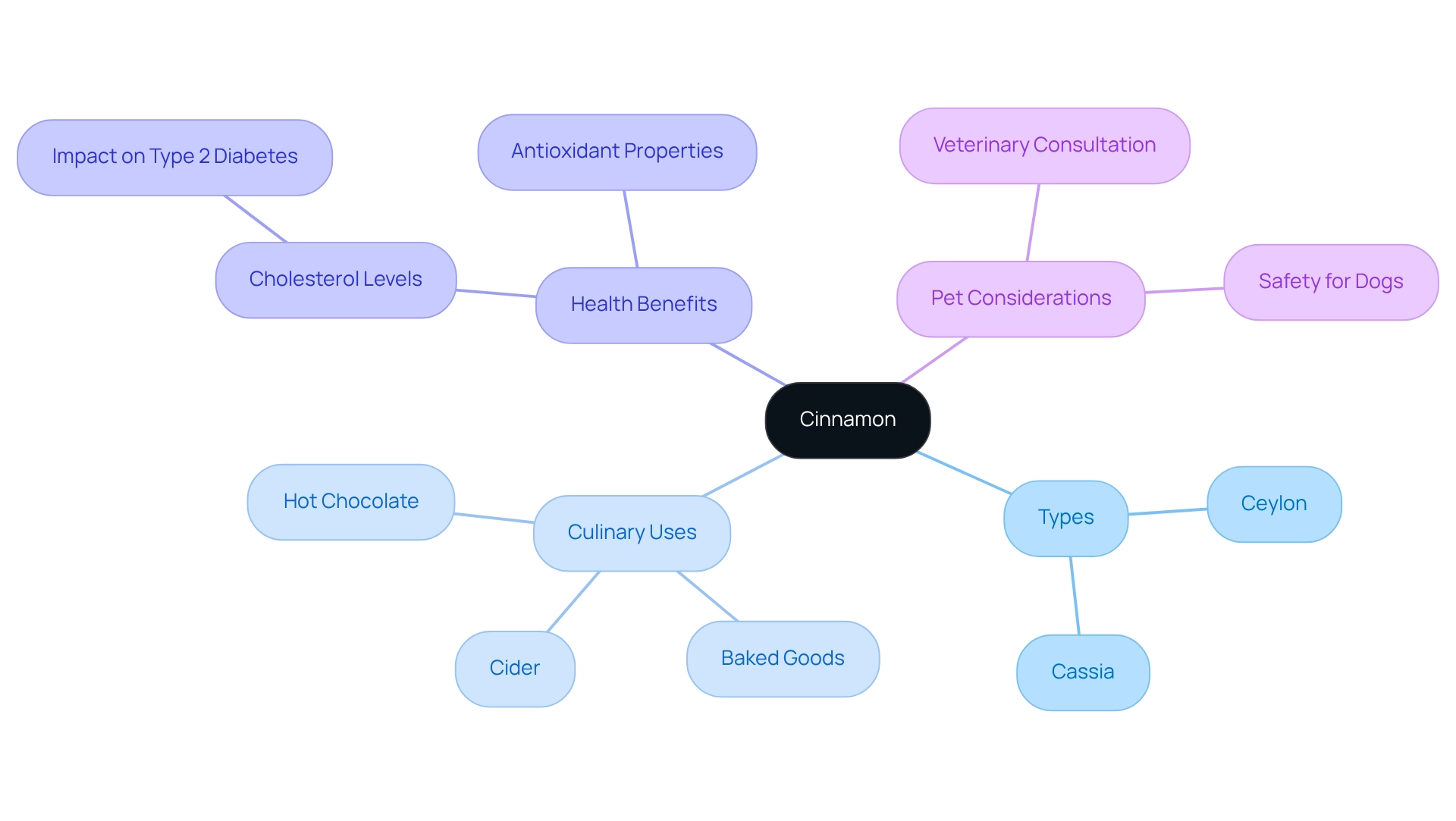Is Cinnamon Safe for Dogs? Essential Steps for Pet Owners
Overview
Cinnamon can be safe for your furry family members when given in moderation. According to the American Society for the Prevention of Cruelty to Animals (ASPCA), small amounts are considered non-toxic. However, it’s crucial to consult your veterinarian before introducing cinnamon into your dog’s diet. Excessive intake can lead to health issues, and essential oils derived from cinnamon can pose significant risks. Remember, your pet’s well-being is the top priority, and a little caution goes a long way in creating a nurturing environment.
Introduction
In the world of pet care, many loving pet owners seek ways to enhance their furry family members’ diets, often leading to the exploration of various spices. Among these, cinnamon stands out as a delightful contender. This beloved spice, known for its warm flavor and potential health benefits, can be a wonderful addition to a dog’s meals when used correctly. However, the safety and appropriate usage of cinnamon are paramount concerns for caring pet owners.
From its anti-inflammatory properties to its ability to support digestive health, understanding how to incorporate cinnamon into a dog’s diet requires thoughtful consideration. This article gently delves into the nuances of cinnamon, exploring its benefits, safety guidelines, and practical tips for pet owners eager to enrich their beloved companions’ culinary experiences.
Understand Cinnamon: What It Is and Its Uses
Cinnamon is a beloved spice derived from the inner bark of trees in the Cinnamomum genus, known for its sweet and warm flavor. The two prominent types are Ceylon, often referred to as the true spice, and Cassia. Ceylon is favored for its superior quality and wellness benefits, making it a wonderful addition to your kitchen. Rich in compounds like cinnamaldehyde, this spice enhances culinary creations while offering potential health advantages. Its anti-inflammatory and antioxidant properties have made it a cherished ingredient in both human and pet diets.
In cooking and baking, cinnamon is frequently used to elevate the taste of various dishes, from baked goods to comforting drinks like hot chocolate and cider. It’s important to note that a teaspoon of ground cinnamon contains only 1.4 micrograms of Vitamin K, which is significantly less than 1% of the recommended daily intake for adults. While this highlights its role as a seasoning rather than a primary nutrient source, it’s essential for pet owners to understand how this impacts their furry family members’ diets.
Research suggests that cinnamon may positively influence cholesterol levels, particularly in individuals with type 2 diabetes. A small study conducted in 2003 found that different doses of cinnamon led to reductions in total cholesterol, triglycerides, and LDL cholesterol, all of which are linked to heart disease risk. While these findings are relevant for humans, pet owners should determine if cinnamon is safe for dogs before introducing it into their pets’ diets and always consult a veterinarian to ensure safety and suitability. Experts emphasize the importance of incorporating quality whole foods into pet diets, and cinnamon can be a flavorful option that enhances both taste and health. However, it’s crucial to remember that before sharing human foods, one must consider if cinnamon is safe for dogs, as not all human foods are safe for them. Therefore, pet guardians should always consult a veterinarian before adding new ingredients to their pets’ meals. At Adventure Den, we prioritize the safety and well-being of every pet, ensuring that their dietary needs are met with care and expertise.

Assess Safety: Is Cinnamon Safe for Dogs?
The question of whether is cinnamon safe for dogs is often addressed, as it is generally regarded as safe for your furry family members when given in moderation. The American Society for the Prevention of Cruelty to Animals (ASPCA) reassures us that, in relation to whether is cinnamon safe for dogs, small amounts of this spice are non-toxic. However, it’s important to exercise caution with essential oils derived from spices, as they can pose significant health risks due to their concentrated nature, potentially leading to respiratory issues or skin irritation. Always ensure that any spice provided is in powdered form and consumed in limited quantities. A practical guideline is to offer a small pinch for small dogs and up to a teaspoon for larger breeds.
While cinnamon is classified as non-toxic, it raises the question of whether is cinnamon safe for dogs, as excessive intake can lead to medical problems. According to statistics from the ASPCA, large amounts of this spice can cause skin and digestive irritation. Symptoms of overconsumption may include gastrointestinal upset and possible allergic reactions, as highlighted in a case study titled “Risks of Cinnamon Consumption in Dogs.” This study found that, despite being non-toxic, substantial consumption can result in serious health concerns. This underscores the importance of pet owners monitoring their pets closely and consulting a veterinarian if they suspect their pet has ingested a considerable amount of cinnamon, as they may wonder, is cinnamon safe for dogs?.
Veterinary professionals typically advise against including this spice in your dog’s diet, emphasizing that it is not recommended even in small amounts. As Anna Burke wisely summarizes, ‘To summarize, yes, canines can consume the spice in limited amounts, but when it comes to the question of is cinnamon safe for dogs, it isn’t essential or advised.’ This perspective aligns with the ASPCA’s stance on whether is cinnamon safe for dogs, emphasizing that while small quantities may not be harmful, they also offer no benefits for your beloved pets. Ultimately, pet guardians should prioritize their pets’ well-being by being cautious with spices, avoiding essential oils, and seeking veterinary guidance when uncertain.
Explore Benefits: Health Advantages of Cinnamon for Dogs
When introduced in moderation, many pet owners wonder, is cinnamon safe for dogs, as it offers a variety of health benefits for your furry family members. Just a teaspoon of this delightful spice can be a safe and nourishing addition to their diet, leading us to wonder, is cinnamon safe for dogs, with no harmful effects anticipated. Its anti-inflammatory properties can significantly alleviate joint pain and discomfort, especially for older dogs or those suffering from arthritis. Additionally, cinnamon is rich in antioxidants, which help protect against cellular damage and support overall well-being. Research suggests that this spice may aid in regulating blood sugar levels, making it a potentially valuable addition for dogs with diabetes. Plus, it can contribute to fresher breath and improved digestive health.
Notably, studies published in the Journal of Alzheimer’s Disease reveal the protective effects of Ceylon cinnamon against cognitive decline, indicating that its antioxidant content may help preserve brain function. In vitro studies have shown that this spice can inhibit the buildup of harmful proteins in the brain, reducing the risk of neurological conditions like Parkinson’s and Alzheimer’s disease. As Dr. Sarah J. Wooten, DVM, CVJ, wisely noted, ‘An earlier iteration of this article referred to turmeric as a beneficial substitute for the spice used in canines,’ which underscores the importance of understanding the benefits of various supplements.
Moreover, the spice’s antibiotic and antimicrobial properties can enhance skin health, protecting against irritation and infection. This is especially relevant for dogs prone to skin issues. While these advantages are promising, it’s essential to remember that when considering if is cinnamon safe for dogs, it should complement, not replace, a balanced diet and regular veterinary care. By nurturing your pets with the right supplements, you can help them thrive in a loving and supportive environment.
Implement Safely: How to Introduce Cinnamon to Your Dog
While introducing cinnamon to your furry family member’s diet can be a wonderful way to enhance their health, it’s crucial to first consider if cinnamon is safe for dogs. Here are some caring steps to follow:
- Start Small: Begin with just a pinch of cinnamon mixed into their food. This gentle approach allows you to gauge their reaction without overwhelming them.
- Monitor Reactions: Keep a close watch on your dog for any signs of discomfort or allergic reactions, such as vomiting, diarrhea, or skin irritations. Your vigilance is key to ensuring their well-being.
- Gradually Increase: If your dog tolerates the initial dose well, you can gradually increase the amount to a safe level based on their size—approximately 1/8 teaspoon for small dogs and up to 1 teaspoon for larger breeds. This gradual approach helps their system adjust comfortably.
- Consult Your Vet: Always consult with your veterinarian before adding new foods or spices to your dog’s diet, especially if your dog has pre-existing health conditions or is on medication. Your vet can provide valuable insights tailored to your pet’s needs.
- Avoid Processed Foods: Ensure that any spice you provide is plain and free from added sugars or harmful ingredients. It’s essential to prioritize your pet’s health.
A recent survey revealed that 15% of participants stated their pet has never required weight loss, highlighting the importance of monitoring your dog’s weight when introducing new foods like spices. By following these steps, you can safely incorporate cinnamon into your dog’s diet and consider whether cinnamon is safe for dogs, potentially reaping its health benefits while ensuring your pet’s happiness.
As Dr. Sarah J. Wooten, DVM, CVJ, emphasizes, focusing on safe dietary practices is crucial, especially when considering alternatives like turmeric. At Adventure Den, we prioritize the well-being of your pets, making us a trusted choice for pet owners who want to ensure their dogs enjoy a healthy and safe diet.
Conclusion
Incorporating cinnamon into your furry family member’s diet can be a rewarding experience for both pets and their owners, provided it is done with care and consideration. This delightful spice, known for its warm flavor and potential health benefits, may help alleviate joint pain, improve digestive health, and even support cognitive function in dogs. However, it is crucial to understand that moderation is key. While small amounts of cinnamon are generally safe, excessive consumption can lead to health issues, emphasizing the importance of consulting a veterinarian before making any dietary changes.
Safety should always be a priority when introducing new foods to your beloved companions. The guidelines suggest starting with a small pinch for smaller breeds and gradually increasing the amount while monitoring for any adverse reactions. This cautious approach ensures that you can provide your furry friends with the potential benefits of cinnamon without compromising their health. Additionally, avoiding cinnamon essential oils, which can be harmful, is vital for maintaining a nurturing environment for pets.
Ultimately, while cinnamon can add flavor and health benefits to your dog’s diet, it should complement a balanced nutrition plan tailored to their specific needs. By prioritizing safety and seeking veterinary guidance, you can enrich your dog’s culinary experiences while fostering their overall well-being. Embracing these practices not only enhances the bond between pets and their owners but also contributes to healthier, happier lives for our cherished companions.
Frequently Asked Questions
What is cinnamon and where does it come from?
Cinnamon is a spice derived from the inner bark of trees in the Cinnamomum genus, known for its sweet and warm flavor.
What are the two main types of cinnamon?
The two prominent types of cinnamon are Ceylon, often called the true spice, and Cassia.
Why is Ceylon cinnamon preferred over Cassia?
Ceylon cinnamon is favored for its superior quality and wellness benefits, making it a wonderful addition to culinary creations.
What health benefits does cinnamon offer?
Cinnamon is rich in compounds like cinnamaldehyde and has anti-inflammatory and antioxidant properties, which can enhance health and well-being.
How is cinnamon used in cooking and baking?
Cinnamon is commonly used to elevate the taste of various dishes, including baked goods and drinks such as hot chocolate and cider.
Does cinnamon provide significant nutritional value?
A teaspoon of ground cinnamon contains only 1.4 micrograms of Vitamin K, which is less than 1% of the recommended daily intake for adults, highlighting its role as a seasoning rather than a primary nutrient source.
Can cinnamon affect cholesterol levels?
Research suggests that cinnamon may positively influence cholesterol levels, particularly in individuals with type 2 diabetes, leading to reductions in total cholesterol, triglycerides, and LDL cholesterol.
Is cinnamon safe for dogs?
Pet owners should determine if cinnamon is safe for dogs before introducing it into their pets’ diets and always consult a veterinarian to ensure safety and suitability.
What should pet owners consider before adding cinnamon to their pets’ diets?
Pet guardians should always consult a veterinarian before adding new ingredients to their pets’ meals, as not all human foods are safe for them.







